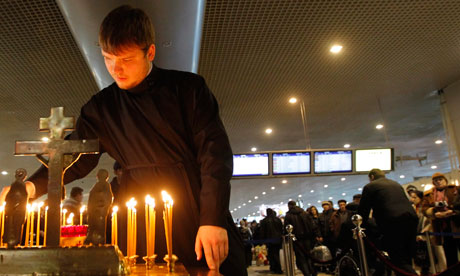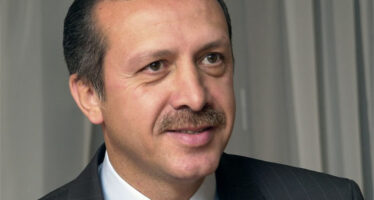Russian investigators uncover identity of Moscow bomber
![]()
Attacker who killed 35 is 20-year-old man from troubled Caucasus region
Gavriel Hollander
A clergyman lights candles at the site of the bomb blast at Domodedovo airport, near Moscow, Russia. Photograph: Yuri Kochetkov/EPA
Russian investigators have said they now know the identity of the suicide bomber who claimed the lives of 35 people in an attack on Moscow’s busiest airport last Monday.
The attacker is a 20-year-old man from the unsettled Caucasus region in the south of the country. Islamist rebels have been battling to form an independent state in the region for several years.
Federal investigators have yet to name the man amid fears that it would damage efforts to arrest the masterminds behind the attack on Domodedovo airport. “It was no accident that the terrorist attack was carried out in the international arrivals hall,” the investigators said. “The terrorist attack was aimed first and foremost at foreign citizens.”
One Briton was killed in the blast, along with nationals from Germany, Austria, Ukraine, Kyrgyzstan and Uzbekistan. A further 180 people were wounded. The British man was named earlier in the week as father Gordon Cousland. The 39-year-old businessman was to marry his fiancee, with whom he has a six-month-old daughter, in April.
President Dmitry Medvedev has criticised transport and police officials and promised tighter security checks. He said security had been in a “state of anarchy” prior to the attack.
Medvedev has sacked Andrei Alexeyev, the head of the transport police for Russia‘s central region, as well as the police chief at the airport and two of his deputies. He has also ordered a criminal investigation into the security lapses that led to the attack.
The blast has cast doubts on Russia’s ability to attract foreign tourism and investment. It comes as the country is gearing up to host the 2014 Winter Olympics and the 2018 World Cup.
Caucasus insurgents have claimed responsibility for a number of deadly attacks in Russia in recent years. In March 2010, rebels bombed the Moscow underground system, killing 40 people. One of two suicide bombers blew up a metro station directly underneath the headquarters of the Federal Security Service (known in Russia as the FSB) – the successor to the Soviet-era KGB.
“There is always a message,” said independent security analyst Pavel Felgenhauer. “If the message with the metro bombings was to show the FSB that they are not out of reach, then the message here is that foreigners should keep away from Russia, it’s a dangerous place. The point was to scare off foreigners, not to maybe kill them, but to hit Russia’s image [and] its economy.”
Related Articles
How ‘Rolling Stone’ was able to bring down a general
![]()
By Guy AdamsWhen the four-star general Stanley A McChrystal received an email asking if he might like to spend a
Turkey: The New indispensable nation
![]()
RECEP TAYYIP ERDO?ANPrime Minister of Turkey Turkey put its imprint as one of the most influential countries not only on
Cuba: autos, casas, corrupción…
![]()
LEONARDO PADURA Ilustración de Patrick Thomas Posiblemente Cuba sea la única nación del mundo en la cual, desde hace medio




